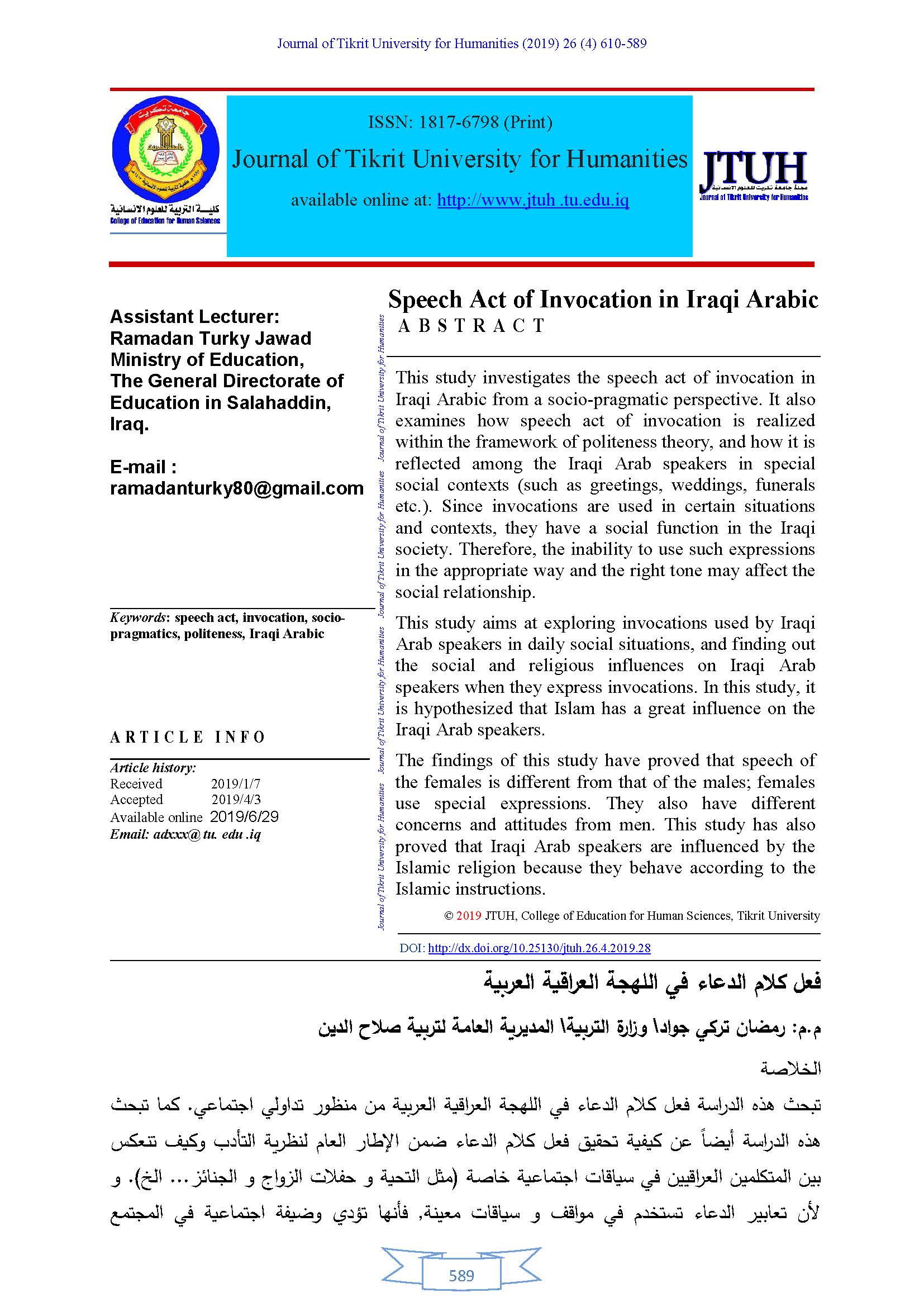Speech Act of Invocation in Iraqi Arabic
Main Article Content
Abstract
This study investigates the speech act of invocation in Iraqi Arabic from a socio-pragmatic perspective. It also examines how speech act of invocation is realized within the framework of politeness theory, and how it is reflected among the Iraqi Arab speakers in special social contexts (such as greetings, weddings, funerals etc.). Since invocations are used in certain situations and contexts, they have a social function in the Iraqi society. Therefore, the inability to use such expressions in the appropriate way and the right tone may affect the social relationship.
This study aims at exploring invocations used by Iraqi Arab speakers in daily social situations, and finding out the social and religious influences on Iraqi Arab speakers when they express invocations. In this study, it is hypothesized that Islam has a great influence on the Iraqi Arab speakers.
The findings of this study have proved that speech of the females is different from that of the males; females use special expressions. They also have different concerns and attitudes from men. This study has also proved that Iraqi Arab speakers are influenced by the Islamic religion because they behave according to the Islamic instructions.
Metrics
Article Details

This work is licensed under a Creative Commons Attribution 4.0 International License.
College of Education for Humanities, TIKRIT UNIVERSITY. THIS IS AN OPEN ACCESS ARTICLE UNDER THE CC BY LICENSE http://creativecommons.org/licenses/by/4.0/
References
- The Noble Qur’an: English Translation of the Meanings and commentary by Al-Hilali, M. and M. Khan (1996). Al-Madinah Al-Munawwarah: King Fahad Complex for the Printing of the Holy Qur’an.
- Abdul-Raof, H. (2006). Arabic Rhetoric: A Pragmatic Analysis. New York: Routledge Taylor & Francis Group.
- Agha, W. (1999). A Study of Congratulations in Mosuli Arabic with Reference to English. (Unpublished MA Thesis). University of Mosul.
- Al-Hiti, S. (1992). Cultural Dissimilarities in English-Arabic Literary Translation. (Unpublished MA Thesis) Al-Mustansiriyya University.
- Al-Jarim, A. and M. Ameen (1999). Al-Balagha tul-Waḍiħa. Damascus: Dar il-Sham.
- Al-Khatib, M. (2006). “The Pragmatics of Invitation Making and Acceptance in Jordanian Society”. Journal of Pragmatics and Linguistics. Vol. 5, No. 2, pp. 272-294.
- Al-Nasser, A (1993). " The Social Function of Greetings in Arabic". Journal of Arabic Linguistics. 26, pp. 15-27.
- AL-Ubaid, A. (2004). Ușul il-Manhaj il-Isalami. Kuwait: Jami’at Iħia’ Al-Turath Al-Islami.
- Ameka, F. (1999). "Partir, C'est Mourir un Peu. Universal and culture Specific Features of Leave-taking". RASK 9-10: pp. 257-283.
- Bach, K. and R. Harnish (1979). Linguistic Communication and Speech Acts. Cambridge: Mass: the MIT Press.
- Barakat, H. (1993). The Arab World: Society, Culture and State. California: University of California Press.
- Brown, P. and S. Levinson (1978). “Universals of Language Usage: Politeness Phenomena”. In Goody, E. (ed.), Questions and Politeness: Strategies in Social Interaction. Cambridge: Cambridge University Press. pp. 56-310.
- --------------------- (1987). Politeness: Some Universals in Language Usage. Cambridge: Cambridge University Press.
- Eelen, G. (2001). A Critique of Politeness Theories. Manchester: St.Jerome Publishing.
- Emery, P. (2000). "Greetings, Congratulating and Commiserating in Omani Arabic". Language, Culture and Curriculum. Vol. 13, No. 2, pp.196-216.
- Feghali, E. (1997). “Arab Cultural Communication Patterns”. Int. J. Intercultural Rel. Vol. 21, No. 3, pp. 345-378.
- Ferguson, C. A. (1970). "The Role of Arabic in Ethiopia: a Sociolinguistic Perspective". In Huebner, T. (ed.). Sociolinguistic perspectives: papers on Language in Society. Oxford University press, pp. 48-58.
- ------------------- (1983). “God-wishes in Syrian Arabic”. Mediterranean Language Review. Vol.1 , pp. 65-83.
- Goffman, E. (1967). Interactional Rituals: Essays on Face-to-face behavior. New York: Anchor Books.
- Leech, G. (1983). Principles of Pragmatics. London: Longman.
- Levinson, S. (1983). Pragmatics. Cambridge: Cambridge University Press.
- Nelson, G.; J. Carson; M. Al-Battal and W. El-Bakary (2002a.). “Directness vs. Indirectness: Egyptian Arabic and US English Communication Style”. Applied Linguistics. (26), pp. 39-57. Oxford: Oxford University Press.
- Saħrawi, M. (2005). Al-Tadawiliah ʕind Al-ʕulmaa’ Al-Arab. Beirut: Dar Il-Taliʕa.
- Searle, J. (1969). Speech Acts: an Essay in the Philosophy of Language. Cambridge: Cambridge University Press.
- ------------ (1979). Expressions and Meaning: Studies in the Theory of Speech Acts. Cambridge: Cambridge University Press.
- Sinfianou, M. (1992). Politeness Phenomena in England and Greece: A Cross-Cultural Perspective. Oxford University Press.
- Tannen, D. and Öztek, P. (1977). "Health to our Mouths: Formulaic Expressions in Turkish and Greek". Proceedings of the 3rd Annual Meeting of the Berkeley Linguistics society. pp: 516-534.
- Trudgill, P. (1974). Sociolinguistics: An Introduction to Language and Society. Harmondsworth, Middlesex: Penguin Books.
- Watts, R. (2003). Politeness: Key Topics in Sociolinguistics. Cambridge: Cambridge University Press.




